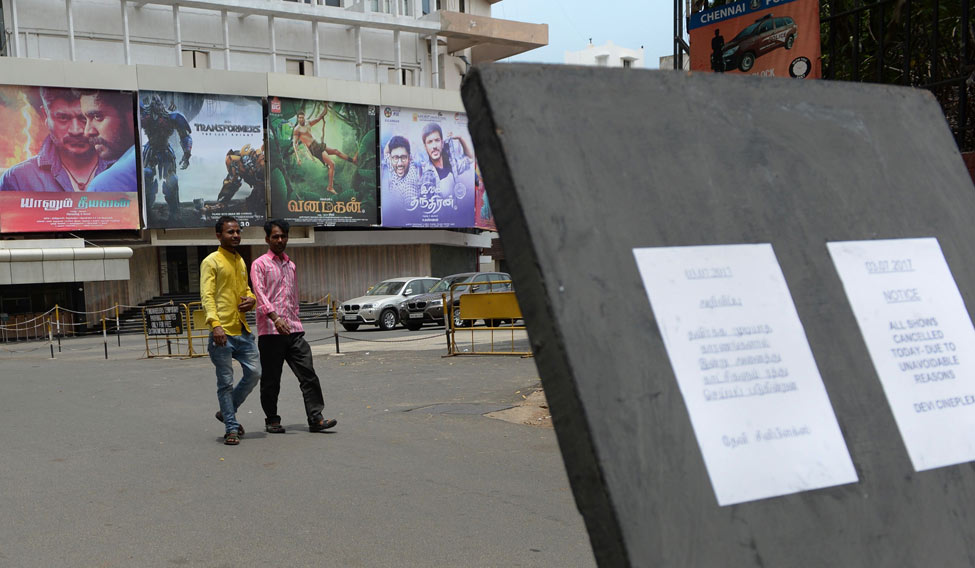“Politics and cinema make strange bedfellows”―Tami Nadu is the best example of this phrase, not only in the long-cherished opportunistic relationship between the rulers of the state and the cinema industry, but also in the economic contribution from the latter to the state’s exchequer as a whole. The irony is that in a state, which has had three long-serving chief ministers―M.G. Ramachandran, M. Karunanidhi and J. Jayalalithaa―from the film industry, the process from production to distribution to screening have come to a halt in the past three days, causing a cumulative loss of Rs 30 crore.
“The estimated loss for a single day stand close to Rs 12 crore. This is on a normal weekday. We are in the third day of the strike now, thus losing over Rs 30 crore,” says Srinivasan of S Pictures.
All 1,100 screens in Tamil Nadu have cancelled screenings in protest against the imposition of 30 per cent local body tax and the GST rate of 28 per cent imposed by the Centre. “The new GST will be an additional burden to us. We are not against GST. But we are already paying 30 per cent local tax, called as the municipal tax to the state government. This means we will end up paying 58 per cent, which is not feasible,” says Abirami Ramanathan, president of Tamil Nadu Film Chamber of Commerce.
Earlier, before the GST rollout, the local taxes, in the name of entertainment taxes stood at 15 per cent. The theatres paid an entertainment tax of 15 to 30 per cent depending on the tax for the Tamil film. The films with a Tamil title and a 'U' certificate were eligible to get a tax waiver. Under GST, the tax waiver cannot be claimed. Ticket prices in Tamil Nadu stand at Rs 50 for single screen theatres and Rs 120 for multiplexes. But on June 30, just a day before the GST, the Tamil Nadu government has announced a municipal tax of 30 per cent on cinema halls. In such a case, the cost of tickets would be very expensive costing at least Rs 290 for a ticket, which would actually cost Rs 230 after taxation.
Now, both municipal taxes and GST together would push the ticket cost to a whopping Rs 320, which is very expensive for a cinema-goer. If GST alone is implemented, 28 per cent tax is applicable for a ticket costing Rs 100 and it would be 18 per cent for the tickets costing less than Rs 100.
In a neighbouring state like Karnataka or Andhra Pradesh, this tax issue for cinema theatres have already been sorted out and regulated.
“We don’t want to put the burden on the audience as this will only end up in people not turning up at the cinema theatres. We want it to be regulated. We only want to pay our taxes and make the ticket pricing the same for different segments ranging from Rs 50 to Rs 120 or Rs 150. We want a fixed price,” says Nikilesh of Rohini Cinemas in Chennai.
Days before the tax rates were finalised, Tamil Big Boss’s celebrity host Kamal Hassan rebelled against the Centre’s decision on GST.
Rajinikanth too has requested the Tamil Nadu government to sort out the issue. “Keeping in mind the livelihood of lakhs of people in the Tamil film industry, I sincerely request the TN GOVT to seriously consider our plea,” he tweeted.
The issue now is the huge loss faced by the industry and the new movies that were doing well on the day of release have now failed to realise good revenue. The recent movie Ivan Thanthiran, starring Gowtham Karthick, has lost its sheen the very day of its release owing to the shut down. The highly anticipated Vikram Vedha starring R. Madhavan and Vijay Sethupathi that was supposed to hit the screens this Friday might get postponed.
“This loss during the weekdays or the normal working days is much less compared to the weekends. If the theatres do not reopen soon, the weekend loss will be close to Rs 50 crores,” says Srinivasan.
Following this development, Lyca Productions, the production house which is to roll out Rajinikanth’s next 2.0 at a whopping budget of Rs 400 crore, has decided not to sign any new projects in the Tamil film industry till the local body taxes are abolished.
The Tamil film industry, which employs at least 10 lakh people, has produced some mega budget films like Robot, Vishwaroopam and Kabali in recent years and earned crores in return through mega films like Baahubali, is now made to bite the dust with the tax burden, which has put cinema lovers and film makers in the state in a fix.





